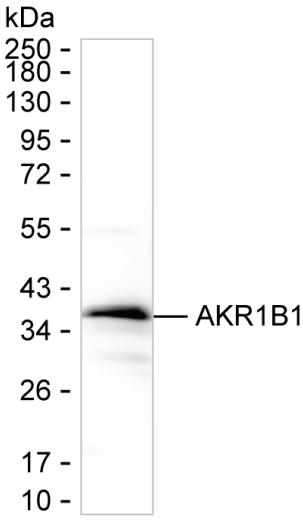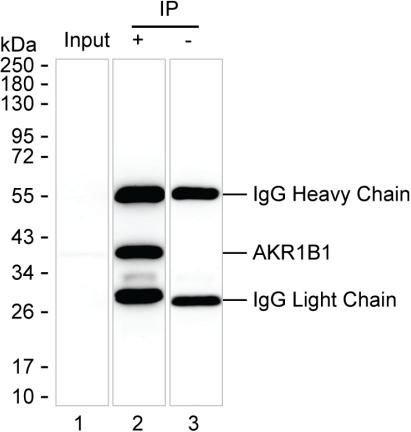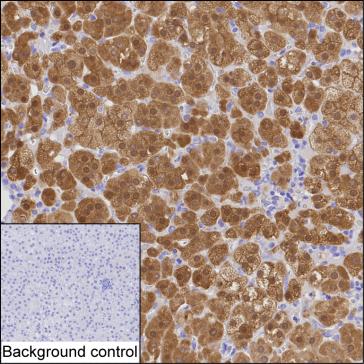


| WB | 咨询技术 | Human,Mouse,Rat |
| IF | 1/100-1/200 | Human,Mouse,Rat |
| IHC | 1/100-1/200 | Human,Mouse,Rat |
| ICC | 技术咨询 | Human,Mouse,Rat |
| FCM | 咨询技术 | Human,Mouse,Rat |
| Elisa | 咨询技术 | Human,Mouse,Rat |
| Host/Isotype | Mouse IgG2a |
| Antibody Type | Primary antibody |
| Storage | Store at 4°C short term. Aliquot and store at -20°C long term. Avoid freeze/thaw cycles. |
| Species Reactivity | Human |
| Immunogen | Purified recombinant fragment of human AKR1B1 |
| Formulation | Purified antibody in PBS with 0.05% sodium azide |
+ +
以下是关于AKR1B1抗体的3篇参考文献的简要信息:
1. **文献名称**:*"Development and characterization of a monoclonal antibody against human AKR1B1 for immunohistochemical analysis"*
**作者**:Yamamoto K. et al.
**摘要**:本研究开发了一种针对人AKR1B1蛋白的单克隆抗体,验证了其在免疫组化中的特异性,并应用于糖尿病肾病组织样本中AKR1B1的表达定位,证实其在病理状态下的上调。
2. **文献名称**:*"AKR1B1 as a therapeutic target in cancer: Insights from antibody-mediated inhibition studies"*
**作者**:Liu Y. et al.
**摘要**:通过使用AKR1B1特异性抗体,研究发现抑制AKR1B1可减少癌细胞迁移和侵袭,机制涉及ROS信号通路调控,提示其作为癌症治疗的潜在靶点。
3. **文献名称**:*"Role of AKR1B1 in diabetic complications: Evidence from antibody-based functional blocking experiments"*
**作者**:Tang S. et al.
**摘要**:该研究利用AKR1B1抗体阻断其酶活性,发现可显著减轻高糖诱导的内皮细胞炎症反应和氧化应激,支持AKR1B1在糖尿病微血管病变中的关键作用。
如需具体文献全文,建议通过PubMed或ResearchGate检索标题及作者获取。
The AKR1B1 antibody is a key tool for studying the aldo-keto reductase family 1 member B1 (AKR1B1), an enzyme encoded by the AKR1B1 gene in humans. Also known as aldose reductase, AKR1B1 plays a critical role in glucose metabolism by catalyzing the reduction of glucose to sorbitol in the polyol pathway. This pathway is implicated in diabetic complications, as excessive sorbitol accumulation under hyperglycemic conditions contributes to cellular osmotic stress and tissue damage, particularly in the eyes, kidneys, and nerves. Beyond glucose metabolism, AKR1B1 is involved in detoxifying reactive aldehydes generated by lipid peroxidation, linking it to oxidative stress and inflammatory processes.
AKR1B1 antibodies are widely used in research to detect and quantify the enzyme’s expression in tissues or cell lines. They are essential in studies exploring AKR1B1’s role in diabetic retinopathy, neuropathy, cancer progression, and inflammatory diseases. Commercially available AKR1B1 antibodies are typically validated for applications like Western blotting, immunohistochemistry, and ELISA. Specificity is a key concern, as the aldo-keto reductase family shares structural similarities, requiring antibodies with minimal cross-reactivity.
Recent research highlights AKR1B1 as a therapeutic target, with inhibitors under investigation for diabetes-related complications and cancer. The antibody’s utility in preclinical models helps evaluate inhibitor efficacy and tissue-specific enzyme expression, underscoring its importance in both mechanistic studies and drug development.
×